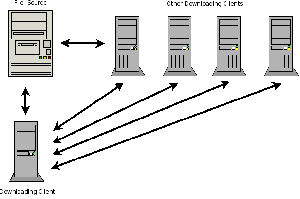Bandwidth Throttling
From Computing and Software Wiki
(→Reasons for Throttling) |
(→Reasons for Throttling) |
||
| Line 2: | Line 2: | ||
== Reasons for Throttling == | == Reasons for Throttling == | ||
| - | |||
| - | |||
[[Image:Torrents.png|right|300px| Torrents allow faster downloads.]] | [[Image:Torrents.png|right|300px| Torrents allow faster downloads.]] | ||
| + | |||
| + | Organizations which practise bandwidth throttling generally cite that 95% of their users are negatively impacted by the large bandwidth consumption of a few heavy use bandwidth consumers. | ||
== Throttling Methods == | == Throttling Methods == | ||
Revision as of 02:29, 13 April 2008
Intro
Contents |
Reasons for Throttling
Organizations which practise bandwidth throttling generally cite that 95% of their users are negatively impacted by the large bandwidth consumption of a few heavy use bandwidth consumers.
Throttling Methods
Bandwidth Cap
Bandwidth caps are a simple method of bandwidth control used by ISPs, which limits the amount of bandwidth (upload and/or download) a user may use within a certain time period. This method has been commonplace for years, and although not all people agree with a bandwidth cap there has been few debates about the practise as it is applied neutrally to all, based on the ISP one registers with. ISPs typically offer a pay per gigabyte option for use beyond the maximum bandwidth limit.
Traffic Shaping
Something.[1]
Social Issues
Chosing what data get throttled / users
References
1. Azureus Wiki A popular BitTorrent client Wiki page
2. Chris Sorensen, "CRTC asked to stop Bell's 'throttling'," Toronto Star: Business. (Saturday April 5, 2008)
See Also
External Links
Rogers Communications Inc. High Speed Internet Comparison
Canadian Radio-television and Telecommunications Commission
Canadian Association of Internet Providers
Signature
--Mcconkbp 01:02, 9 April 2008 (EDT)

